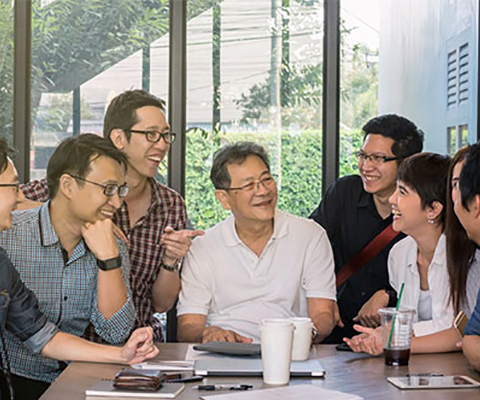You are now reading:
4 ways to retain and protect Singapore's Senior workforce
1 of 3



Starting or growing a business? Enjoy more than S$4,000 savings now with essential solutions. T&Cs apply.
Find out more
Your go-to sustainability guide. Get your customised report today by taking the quiz now.
Take the quizyou are in GROUP WHOLESALE BANKING


You are now reading:
4 ways to retain and protect Singapore's Senior workforce
Singapore's workforce is ageing. Due to high life expectancies and low fertility rates, Singapore has the second-fastest ageing population1 in the world. The government has been addressing this issue over the years with adjustments on its policies to support an ageing society.
For instance, they announced a gradual increase in both the retirement and re-employment age to 65 and 70, respectively, by 20302. CPF contribution rates for senior workers aged 55 to 70 will also be raised gradually from 1 January 2022 onwards2.
To help businesses adjust to these changes, the recent Budget 2020 saw the announcement of a Senior Worker Support Package. The package offers employers grants as well as wages and CPF offsets to employers who employ senior workers and raise their own retirement ages ahead of the deadline3.
Employers must thus make the best of their senior workers to combat the labour crunch from a shrinking workforce.
Here are four ways employers can retain and protect their senior workforce.
For Singapore to thrive with an ageing workforce, it must discard any negative attitude against senior workers.
This may stem from outdated stereotypes that senior workers are 'slow' or 'less productive.' But research shows they may, in fact, be more productive than their younger colleagues. One scientific study4 found their mental performance was more stable over time, as their length of experience more than made up for any age-related declines. In Germany, studies done at a BMW plant reported similar findings5 - senior workers were more productive and made fewer errors.
As such, employers must find and eliminate such attitude. Companies can start by adopting the new Tripartite Standards on Age-Friendly Workplace Practices6. Jointly developed by the Ministry of Manpower, National Trades Union Congress and the Singapore National Employers Federation, these standards help employers create more age-inclusive work environments.
For instance, the human resources department can draft policies that bar age from being part of the hiring process. Management can also do their part by highlighting the contributions of senior workers and encouraging people of all ages to work together. Mentorship programmes, where senior workers help coach their younger and less-experienced colleagues, are other ways to highlight the capabilities of these workers.
Flexible work is a popular perk across various industries as it helps to retain staff amid labour crunch. According to some studies, up to 80 per cent7 would like at least some form of flexible working hours. To senior workers, this form of work arrangement could entice them to stay in the company.
For instance, the Ministry of Manpower8 found that flexible hours had the highest impact on staff retention. Take the example of ACE Services, a local hydraulics repair company that has over 20 per cent of its staff aged 50 and above. The company saw a 40 per cent decrease in staff turnover after the implementation of flexible-working hours.
The Senior Worker Support Package gives companies a further incentive to implement flexible hours. It offers grants to companies that voluntarily commit to providing part-time employment to eligible senior workers9. Companies can thus leverage on the package to formalise their re-employment provisions and provide flexible working opportunities to those who want and are able to contribute.
Technology and automation can be used to make the workplace more comfortable and safer for senior workers.
For example, Lifeline Cleaning10, a local cleaning company with 80 per cent of its cleaners aged above 50, invested in automated road sweepers and battery-operated carts for garbage disposal. The result? Senior workers were found to be happier and more productive. In the 2020 Budget, the government also introduced the SkillsFuture Enterprise Credit, which provides employers financial incentives to employers to undertake enterprise and workforce transformation (i.e. reskilling and upskilling) programmes11
To deal with the negative aspects of job replacement from technology, employers should look at upskilling senior workers. While it may be more difficult for them to learn new technical skills, soft skills can be improved at any age. In fact, with increased automation, soft skills become more, not less, essential - the human aspect becomes increasingly valued.
As workers age, they become more concerned about their health and healthcare costs. In 2018, Singapore's medical cost inflation was ten times the annual inflation rate12 and this trend is not slowing down. Elderly healthcare costs are expected to reach SGD 66 billion annually by 2030, a tenfold increase from 2016.
Each senior will thus need an average of SGD 51,000 annually, the highest costs in Asia Pacific13.
Such surprising medical costs affect senior workers, particularly if benefits programme does not cover them. They may delay going for medical check-ups due to medical expenses and end up working at diminished capacities; thus, affecting productivity. Worrying about healthcare costs may also add to mental stress which again might reduce productivity.
This is not only bad for the employee, but for the company as well. That is why having a comprehensive employee medical benefits programme, especially for senior workers, is essential. When they are healthier and know that their employers have their best interests at heart, they will be more willing to give their best.
At UOB, we offered customised employee medical benefits programme to cater to the needs of an ageing workforce. Contact us today to find out more.
References:
1http://theindependent.sg/singapore-worlds-second-fastest-aging-society-to-up-retirement-age/
2https://www.mom.gov.sg/about-us/budget-highlights-2020#senior-worker-support-package
4https://www.ncbi.nlm.nih.gov/pmc/articles/PMC2914582/
5https://www.aarp.org/work/job-hunting/info-07-2013/older-workers-more-valuable.html
6https://www.tal.sg/tafep/getting-started/progressive/tripartite-standards#age-friendly
7https://sbr.com.sg/hr-education/news/4-in-5-singapore-employees-want-flexi-work
8https://www.straitstimes.com/singapore/manpower/higher-share-of-workers-in-firms-offering-flexi-work
9https://www.singaporebudget.gov.sg/docs/default-source/budget_2020/download/pdf/annexb3.pdf
11https://www.skillsfuture.sg/sfec
13https://www.straitstimes.com/singapore/health/elderly-health-costs-to-rise-tenfold-by-2030-report

20 Nov 2025 • 5 mins read

12 Aug 2025 • 7 mins read

30 May 2025 • 3 mins read

29 Apr 2025 • 3 mins read